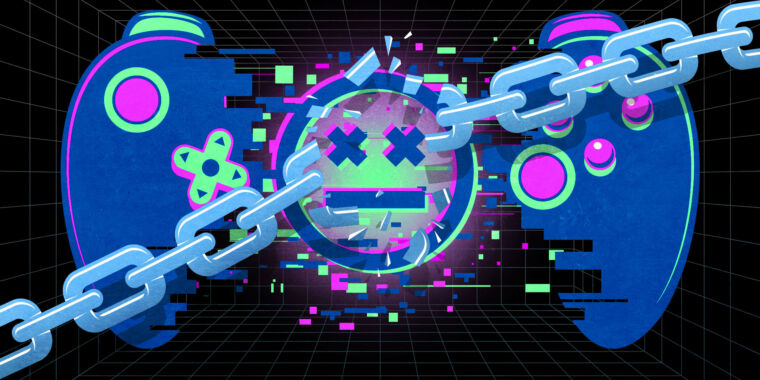Gotta love DRM that makes paid versions of games worse than pirated stuff.
COO says coming benchmarks will show anti-piracy tech has no performance impact.
They do decryption and network calls during runtime. Computers are not magic, you cannot do additional processing, call on external resources and not have a performance impact. I will never trust when they say this, not once ever. They have a vested interest in convincing people of this even if it’s simply not possible.
Resident Evil Village was a good example of that. People tested the two versions, and the cracked one was significantly faster on all runs. Even media reported on it.
https://www.pcgamer.com/resident-evil-village-drm-denuvo-stuttering/
They even ended up removing denuvo from resident evil because of the performance issues
https://www.pcgamer.com/capcom-removes-denuvo-from-resident-evil-village/
Capcom did not remove Denuvo due performance impacts. They released an update without it because the big bucks from selling the game happen early in the games lifespan, not year or two later.
Denuvo is a license model, so the longer game contains it, the longer the company needs to pay for the license.
It’s merely a cost savings removal, as happens with many games that contain Denuvo.
on a modern PC doing that is almost entirely trivial if implemented correctly, I hate DRM but to be honest they may be right that it has no appreciable effect on the final performance of the product for the vast majority of users. Of course that’s dependent on proper implementation, what are the odds these folks at Denuvo can do that? pretty low.
Activation limits and compatibility are the biggest issues for me.
Well… modern computers have crypto accelerating instructions, and games rarely use all the cores to their full potential, offloading as much as they can to the GPU instead, while network traffic is relatively minimal, so it is possible to run a lot of stuff on the same computer without impacting the performance of the game itself.
That doesn’t fix the rest of the problems, though.
Sure if the person’s PC is well beyond what is required they won’t notice it, but I’ve played on old and underpowered PCs with bad internet connections enough not to assume that there will be always plentiful resources to spare.
Fair point, but does Denuvo apply to games that run on underpowered PCs? I might be mistaken, but I thought Denuvo was only meant for the “AAA” titles that require top tier hardware anyway.
What i you’re right at or below the “minimum requirements” for an AAA game? Should those people just not get to play?
Then you’d get a degraded experience anyway, I don’t think the difference would be noticeable. Where it would be noticeable, would be with retro games on pretty old hardware.
Either way, even if it were to slow a game by 50%, that would still not be the biggest issue with Denuvo.
One percent from ~ 45avg fps, especially the low drops, feel worse when there’s even more intermittent losses from DRM.
It’s harder to notice a few fps drop at 100+.
we’re seen as evil because we’re helping DRM exist and we’re ensuring people make money out of games
No, you’re seen as evil because your software is an inefficient and invasive security risk that makes games significantly worse, and compromises/punishes your paying customers in the quest for more money.
I no longer pirate games (thanks to Steam), but I’ll never buy one with Denuvo.
Fuck allllll the way off.
If you are treating your paying customers worse than someone you perceive as stealing from you, you are doing something seriously wrong.
Piracy is just a fancy word for price sensitivity.
Photoshop would not have the market dominance that it enjoys if college kids where not pirating it for a decade.
My son knows how to model in blender because a 12 yr old cannot afford maya. In a generation blender will own the space. He will never use maya.
Napster created a generation of music fans that put way more money into the industry than previous generations ever did.
A certain amount of loss should be tolerable, because it is often the pathway to future growth. A pirated copy isn’t a lost sale, it’s your investment in the next generation of consumers
I’m honestly shocked Adobe hasn’t tried to capitalize on the people who pirate from them, considering they’re the one company where the service is good and the cost is not
Do you know how much they’d take in if they had a yet cheaper tier for certain apps with a ‘personal use only’ clause or something? Probably a fuck ton if i had to guess
I know right. The fuck should I pay 10/mo to use Lightroom as a hobby photographer who will never make a dime off my images? 25-50/yr and I would never even look at the alternatives.
The free hobby license for fusion 360 means I am sort of locked in to auto desk CAD software because it is all I have used for years now. Big win right?
In a way they did, the base Photography plan is ridiculously good value. PS + LR for US$120 a year. It’d have cost me more to buy both outright back then (US$800 + US$400 upgrades every 2-3 years).
As long as it’s as effective as it is, they’ll keep using it.
For example, the latest FIFA game that was cracked is FIFA 19. The rest are still safe thanks to Denuvo.
Yeah, but that might just be that no one cares enough about the FIFA games to waste energy cracking them, not because of Denuvo specifically.
Aren’t they extremely popular still…? Highest selling sport series of all-time from what I can see. Certainly not as liked these days though, that’s true.
Yeah but it took the Hogwarts game like a week to be cracked with the most restrictive denuvo in place. If there’s demand for it someone will crack it.
They’re popular among a different crowd than those who would go online to talk about video games.
If enough people want a game with denuvo to be cracked, it gets cracked.
Good luck. DRM in the hands of corporations will pretty much always be used for evil.
Start off with something simpler, like convincing me water isn’t wet or the earth is flat
Glad to see this vile malware finally catching some serious flak.
I just switched to only buying games on GoG. Yeah, i dont have the same selection and miss out on a lot of games, but there are enough quality games on GoG to fill my backlog.
It’s hard to see something that gets in the way of my ability to enjoy games as not evil. After all, I’m not getting paid and profiting from my inconvenience of the product I bought. Why would I care about some corporate spiel justifying why to make the product worse for me. Pay me and then I’ll nod my head. Otherwise I just want my product to work unhindered. It’s not an act of charity that I bought the game.
Until then using handheld like the steam deck and encountering issues like license renewals getting in the way of playing offline reminds me my product is inferior to cracked versions. Or stuff like denuvo getting in the way of some people playing their games due to activation limitations.
https://steamcommunity.com/app/678960/discussions/0/3764480479613668556/
Whats next. Phone manufacturers actually expecting me to believe they are looking out for me by making third party replacements impossible, and have to opt for first party service that makes fixing my old phone more expensive than buying a new one?
Go play in traffic denuvo.
Yeah and Skoal really wants to convince you cigarettes arent bad for you
I would download a car and 3D print it. I would NOT download Denuvo and add an(other) backdoor to my kernel.
It’s not evil. DRM as a concept is not evil. There is actually no real philosophical justification for why it is wrong to use DRM to protect your software. Because if you made it, it is yours and you get to decide how other people use it.
The paranoia that surrounds things like DRM show just how laughably selfish and entitled some gamers are.
Malicious software that harms your computer’s performance and security, and prevents you from inspecting and modifying the application, is evil.
I develop software myself. It does not contain anything even remotely resembling Denuvo. I don’t appreciate it when people pirate my software, and I’ve caught them doing it, but that doesn’t mean I’m going to add malicious features that effectively punish my customers for not pirating my software. That would be idiotic.
Making non-user-hostile DRM is a hard problem, though. It has to at least make piracy inconvenient, but at the same time, it has to not stop people from reinstalling on a different computer or using the program offline.
The best solution I can think of is for the program to check in with a server when it runs, so you can’t run it on more than one computer at a time, but allow it to be used offline for up to, say, a week after the last time it was used online, so you can’t easily defeat the DRM by blocking it at the firewall.
Anybody got any better ideas?
Malicious software that harms your computer’s performance and security, and prevents you from inspecting and modifying the application, is evil.
This is fearmongering. What is always left out of these conversations is exactly how Denuvo is a security risk, which is a tech question of this particular software and not a philosophical one. And I’ll be frank with you, I think people vastly overstate how much of a problem Denuvo is as a piece of software.
Denuvo uses a kernel-mode driver as part of its overall malware deployment. If you don’t know why that is a problem, I can’t help you.
Why wouldn’t gamers be entitled? Do you forget that buying games is consumerism and that it’s not an act of charity? Is it not normal to feel entitled to features when you are looking to buy a good or service? What’s with this recent shift in people seeing corporations as friends.
Imagine saying wow people who buy power tools are so entitled for not expecting them to break when they try to use it. Gamers are pretty weird group where at times the reverence they hold for what is at the end a business and requires a checks and balances of consumers and business fighting each other to keep balance instead shifts towards sympathy for companies.
You’re missing the point.
If I strip all the DRM BS from my software (not just games, it’s a big problem with ebooks, music, etc. as well) I actually own this stuff. I can hoard it away on a hard drive, use it without anything like Steam or any online service, I don’t need to ask someone for permission to use this thing that I bought and actually physically have with me any more. Or in the case of ebooks, I can actually use this file I’ve got sitting around on whatever device I wish, because I bought the book. It’s mine. They don’t get to tell me what I can do with it.
…And frankly, while I don’t “pirate” software because I agree that people deserve to be paid for their work, the single greatest advancement of modern technology is that things can be freely copied. We went from copying books by hand, to printing presses, to now being able to distribute them at no cost whatsoever beyond the infrastructure of the internet. If that makes a lot of typical business practices untenable, I think we should let them be untenable and figure out how to respond to that rather than nerfing the single greatest invention of the modern era just to make sure some capitalists stay happy.
My man.
When a rerelease of a Gameboy advance game can’t be launched offline, that’s a problem. (MegaMan battle network collection)
As Gabe Newell said, piracy is a service issue. Why would I buy that collection when I can emulate my old copy instead? It’s a few extra steps, so I would rather have had it just work on steam, but Denuvo kept me from doing it. This mattered recently because I went on a vacation with the steam deck and didn’t have internet at a few points.
Sure, DRM isn’t inherently evil, but when it makes the experience worse for paying customers when compared to pirates, it really looks that way.
Also note that in this case, emulation is not piracy, but if I wanted to play the collection edition offline then piracy would have been my only option.
Am I selfish for paying money and wanting to use the software I bought a personal license to on my own, without internet? I think it’s selfish of the company to demand that I play their originally offline-only games online-only. Am I selfish to want to play the Spyro Reignited trilogy without aggreeing to an arbitration clause? I think companies have gotten selfish lately and paying customers have no choice but to either not play modern AAA games, pay and have a potentially worse experience when paying, or pirate and not deal with the technical and legal/privacy garbage surrounding modern AAA releases, including DRM. I didn’t even mention yet how if a game you purchased a Denuvo license to does not get an update to eventually remove the protection, it will become unplayable when they shut the activation server down.
I remember my first awful experience with DRM with the game Spore, where I had a period of time when I moved between or upgraded my computer enough to where I ran out of activations and could not longer play my physical copy of the game despite there not being a single current activation of the game out there. There was nothing I could do about it, because there was no way to deactivate a copy even if you knew you would be changing hardware soon. I didn’t have income then, so it left a very sour taste in my mouth. We came from physical copies we could resell, to this? DRM lets companies manage game licenses on their terms, but their terms suck.
As Gabe Newell said, piracy is a service issue.
I’ve selected this text as I think it’s the heart of your post, if you disagree then let me know. I don’t agree with this statement, I think that it is a rights issue, and I think I can prove that with a thought experiment.
Suppose for example, game companies took this idea to heart and did not do anything to stop piracy, they only focused on providing the most seamless storefront and gaming experiences possible. They create a store that works perfectly, has all the features you’d want, and has no DRM of any kind - this includes no log in needed, they go by the honor system. They expect people to only download a game that they’ve paid for. Here’s the question: will people pay for the games or not? I have a view of human nature that people generally go along the path of least resistance, and I think this is born out by evidence (but I could be wrong about this). Some people will pay for the games on moral grounds, the vast majority will not. If a developer wants to get paid, they have to make sure people pay for it. And now we have DRM. The goal of DRM is to make piracy annoying enough that the path of least resistance is to just buy the game.
This, to me at least, proves that piracy is only a service issue in a world where DRM exists. Because DRM makes piracy annoying. If people find the DRM more annoying than piracy, it has failed to be effective DRM.
So to get to the heart of things, I agree with you that when DRM is more annoying than piracy something has gone terribly wrong. Denuvo, in my life, for the way I play games, is not and never has even gotten close to being more annoying than piracy.
But at the end of the day, I don’t think it is morally or ethically wrong to put DRM on a game or storefront. I just see it as something to work out on a practical level, case by case. But I made my original comment in the first place because it seems to me like a lot of people have issues with it on a moral level, which I think is silly.
If a developer wants to get paid, they have to make sure people pay for it. And now we have DRM. The goal of DRM is to make piracy annoying enough that the path of least resistance is to just buy the game.
You’re assuming the only options are no DRM and voluntary payment, or DRM and mandatory payment. You can still have a normal storefront and actually ask for money, and still sell games (or software in general) without DRM. GOG does this, for example, and they’re doing fine.
No, you can’t have mandatory payment for DRM-free media. That’s why all bookstores operate on an honour system and let you walk out of the store without paying for the books you take with you.
Haha yeah, never really understood people thinking DRM would cause everything to crash when Cyberpunk 2077 being such a success even with the terrible launch argues against that.
Here’s the question: will people pay for the games or not?
It’s not like Witcher 3 or Cyberpunk 2077 even with all the bug issues weren’t a big financial success or anything…
I think you are operating under the assumption that everyone would pirate or that a large portion of the public that pirates would have gone on to buy the game during the first couple of months if they couldn’t pirate it.
From your source:
With the exception of recently released blockbusters, there is no evidence to support the idea that online copyright infringement displaces sales
Denuvo is used almost exclusively in exactly the scenario where the study supports the idea that piracy hurts sales. I don’t think the study helps your case.
I’ve been a hardcore pirate for 30 years. I still buy a lot of games even when empress has broken the denuvo implementation. I always have and always will use piracy in place of a decent playable demo. Consider it market research. If your product is shit, or I finish it in a day then you don’t get my money.
Yeah, Witcher 3 and cyberpunk 2077 really bombed because they didn’t use denuvo. Real shame.
You can really see how much they were affected with PC sales unfortunately outselling the more mainstream consoles because they chose to not protect their game with DRM https://www.techspot.com/news/84781-witcher-3-pc-outsold-all-console-versions-combined.html
wanting gamedevs to be worked to death and uninformed demands for features with zero idea of the technical requirements = ‘entitled gamers’
not wanting malware on your computer = not being ‘entitled’
I don’t pirate PC games for numerous reasons, but none of them are really moral. Trying to convince people that they should accept things like this on moral grounds is a poor argument anyway.
People who were around for the Sony DRM rootkit scandal will always be against DRM. I was one of those people, while I agree there is a right to protect your software, it often comes at a loss of performance, protection and/or privacy of the end user.
https://en.m.wikipedia.org/wiki/Sony_BMG_copy_protection_rootkit_scandal
Yes, and you have to weigh the loss of performance and/or privacy on a case by case basis. What bothers me is that people take cases where DRM strongly impacts the experience of the thing, and apply it as a general argument against DRM, when that is not an argument against DRM, but an argument against using that particular piece of software.
I’m kind of tired of DRM headlines in my feed. Whether a game has Denuvo or not doesn’t actually matter when purchasing a game. What matters is this: is the game fun? Does the game pass the bar of acceptable performance? Discussions around DRM are mostly a distraction and a diversion from things that actually matter.
The common stance against DRM is not the “entitled” part, but to be able to keep playing it even if the companies involved are gone. For games with Denuvo or other DRM there are things like these to consider:
- the Denuvo company’s server shuts off(whatever reason, blackout, maintenance,etc), your DRM now can’t verify if you have legit copy or not.
- the game company shuts off, no one left to patch out DRM, your game is in limbo. (cause they have to pay Denuvo to keep the licensing/verification. )
- your internet went off.(this part depends on game and how often they need to refresh the “valid” token)
With games that have no DRM you have none of the above concerns.
I am vehemently opposed to Denuvo because I have personally compared the Denuvo protected product VS the cracked product and the performance impact of Denuvo was nothing short of horrific.
My paid experience was worlds worse than the experience of those that chose not to pay, and there is no legal way for me to get that same experience. To be clear, not all games are impacted so badly but many are.
Having said that, if a developer wants some form of DRM on their game because they (wrongly) believe not having one will affect sales then I do believe they should have a right to do so. I just think that there should be a legally mandated time limit on how long they are allowed to do so. 12 months from release seems fair. After 12 months, you have moved most of your units. Sales after this point basically come down to special offers and how well you support and maintain the multiplayer portion of your release.
I would personally choose to wait the 12 months until I can actually own the game, and as a sort of litmus test for the long term viability of the franchise. If there is still a significant playerbase after 12 months then it’s probably worth my money.
You know these are valid concerns, and I have two thoughts about this. The first is that I don’t understand how this doesn’t also apply to Steam or Epic Games or any other basic storefront (except GOG of course). I see a lot of headlines about Denuvo but none about Steam. People seem to selectively apply their hate in this matter.
The second thought that I have is that I agree that this is a problem, but I don’t see any other way around it. This is just the trade off of getting AAA games. These are big, complex pieces of IP that require millions to hundreds of millions of dollars of investment that the company making them has to recoup. To ensure that you actually get paid, you have to have DRM. Companies wouldn’t shell out the millions of dollars on DRM unless it was proven to actually work. As I see it, if you like AAA games you just gotta weigh the cost on a game by game basis.
I see a lot of headlines about Denuvo but none about Steam.
Steam is a platform used to sell games and DRM is optional. Denuvo itself is a specific type of DRM that people have experienced issues with the most whether it is interruptions to offline play or 5 activation limits. It’s why the specific DRM is being focused on that has been the most draconian of the other DRM that exists, since it has been the most frequently disruptive over less overbearing DRM.
Most GOG games ship entirely free of protection, it’s kind of their thing. As for steam, getting around the online checks is trivial.
The issue is ownership of the goods you bought. If the barrier to ownership is slight, I don’t have a big issue with it. Denuvo is a serious barrier and has serious impacts on performance.
What matters is this: is the game fun? Does the game pass the bar of acceptable performance?
Game working when you expect it to is pretty important. Imagine getting a car and finding out it is overly sensitive to having to have the right climate to be able to use.
Only area where that doesn’t really apply is for rental services like streaming or game pass, which in that case does make sense why it would have DRM since it’s just part of a subscription.
Funny how you mention performance as something than matters when claiming nobody is allowed to take a piss at denuvo, when denuvo is known to hamper performance in some cases.
With them insinuating that not wanting DRM means people are entitled and selfish in other posts and underplaying incidents where Denuvo has been problematic I’m wondering if they are associated with Denuvo. They’d of course deny it since what company wants to make headlines for that, but I’m getting the impression Denuvo is something they want to be ubiquitous.
“Because if you made it, it is yours and you get to decide how other people use it.” why shouldn’t people be allowed to use software how they want?
Because you didn’t make it. I’ll grant that western ideas about intellectual property are weird and inconsistent, but I’m taking it as a given that we hold that idea in common. If a writer writes something, that sequence of words in the order they wrote is their “property” and they get to determine who gets to see it.
I am cognizant that in this kind of space a lot of people probably won’t hold this view of intellectual property and there are good arguments as to why it shouldn’t exist at all. I suppose at this moment I’m not really in the mood to go down this rabbit hole, so forgive me if that is where you want to go.
That isn’t how we view writers at all though. Writers can refuse to sell you a physical book if they’ve made that, sure, but they can’t stop someone from selling you a used copy, or one that ended up in the hands of a library from being lent to you. They can’t stop you from sharing your copy of their book with a friend, or reading it to someone, even if they don’t want that someone to see it.



















